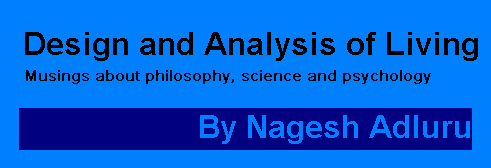In academia productivity is measured in terms of quality and quantity of publications one generates. In industry productivity is measured in terms of money one generates. I intend to analyse in this post the chief characteristic difference between academic and industrial efforts and how this characterisation demands for balance between the two type of efforts. Similar demands for balance in different walks of life arise from different characterizations as well. Almost always it's the variety of perspectives that automatically demands for balance if we are to survive "long enough".
The main characterization is that the motivation underlying the effort in academia is "first assimilate and then deploy" while that in industry is "first deploy and then assimilate". Now which strategy is optimal? Human progress is gradual and continuous and for us to actually survive and measure the progress we need to switch between both strategies: one cannot wait until we answer all the questions about an idea to be deployed. Think about it, science would not exist otherwise! Similarly one cannot just jump into conclusions without understanding the soundness and limitations of an idea. Think about it, science would not be science as we see today otherwise. So we naturally need a balance between both kinds of motivations similar to that in my means and ends post.
Now for maintaining such a balance the conferences and corporations which are main arenas for both the efforts need to be designed carefully to fuel both types of motivations. Conferences should primarily be motivated to support the academic effort which means they have to provide for ideas which need time to be studied, analysed, assessed, assimilated and then deployed. Similarly corporations, to take on deploying the ideas so that they can be disseminated and become "accepted as a norm". Lately conferences (in many areas of CS) seem to be driven overly by motivations underlying industrial effort. This is partly because of increased short-sightedness of public funding agencies and increased reliance on corporations. This makes papers on "industrially hot topics" get more accepted in the conferences. This year's CVPR results kind of ascertain that as well. This kind of change is also becoming an increasing concern even in theory community.
Usually such crisis points occur in cycles and these are the points to check for the balance. I once presented a paper by Christos Papadimitriou addressing such crisis in databases theory. Since conferences are usually run as peer-reviewed and mostly non-profit, issues like conflicts of interests etc. play more important role than in corporations. Checks on corruption in academic community are more important because it is typically "assumed" not to exist the machinery for such checks is not given so much weight. It is important to remember that investigations in academia are mainly curiosity driven excercise not frustration driven. This should be supported but not exploited to make it go otherway around.
Sunday, March 09, 2008
Subscribe to:
Post Comments (Atom)

No comments:
Post a Comment